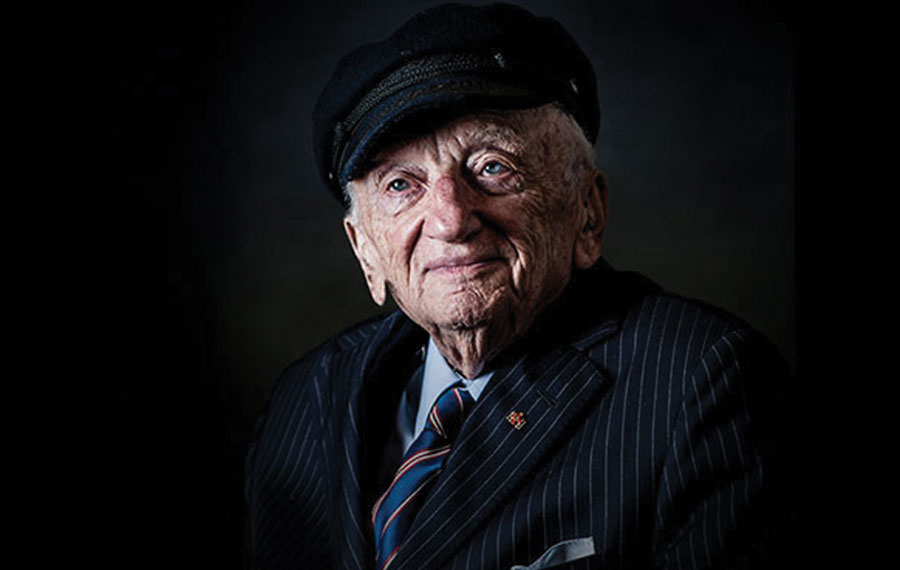 Ben Ferencz
Ben Ferencz Among the most high-profile cases in the Nuremberg Trials from 1945 to 1949 was the prosecution and conviction of 22 members of Heinrich Himmler’s Einsatzgruppen death squads. The prosecutor in the case was a 27-year-old Jewish lawyer named Ben Ferencz and, chances are, you’ve never heard of him. Writer-director-producer Barry Avrich has endeavored to correct that with his new documentary, “Prosecuting Evil: The Extraordinary World of Ben Ferencz.”
“Ben should be as well known as Martin Luther King Jr., Mahatma Gandhi or Mother Teresa,” Avrich told the Journal. “Part of my mission with the film was to make sure that people know who the 99-year-old Ferencz is, and will always remember him and his legacy.”
Avrich first learned about Ferencz in 2017 when he saw a “60 Minutes” segment about him. He contacted Ferencz the next day and got the go-ahead to make the film. “I’ve made close to 50 documentaries. This was the simplest green light I’ve ever received,” he said. “Two months later we were filming.”
The documentary chronicles Ferencz’s life and accomplishments through archival footage, contemporary footage Avrich shot in Nuremberg, and interviews with notables including Alan Dershowitz, Gen. Wesley Clark, and Ferencz himself, who lives in Delray Beach, Fla.
Avrich interviewed Ferencz for eight hours, after which the nonagenarian jumped into the pool — as he does daily — for the cameras. Avrich marveled at his subject’s vitality, optimism and acute awareness. “He reads newspapers. He goes online. He stays focused. He’s alert, cognizant, fit. As you get older, you have two choices: Let age swallow you up or fight it. He fights it.”
“Ben’s religion was irrelevant. He’s not a religious man. It’s not what drove him. He’s a crusader, and his mantra is law over war.” — Barry Avrich
As the film chronicles, Ferencz’s family fled anti-Semitism in what is now Hungary, arriving in New York in 1920 when he was 10 months old. Despite meager circumstances, he studied hard and went on to graduate from Harvard Law School in 1943.
After enlisting in the Army two years later, and serving under Gen. George Patton, Ferencz was transferred to Patton’s headquarters in England and tasked with collecting evidence of Nazi war crimes. Ferencz uncovered recorded evidence that convicted the 22 Einsatzgruppen defendants, 13 of whom were hanged. But his work didn’t end there. He was instrumental in helping Jews reclaim property taken by the Nazis and in getting Germany to agree to preserve hundreds of Jewish cemeteries in perpetuity. He argued human rights and civil liberties cases, wrote books on international criminal law and spearheaded the creation of the International Criminal Court in The Hague.
“He considers his greatest contribution to be the work he did after World War II in helping to set up the restitution programs for Holocaust survivors, not only Jews but all those who had their lives ruined,” his son, Don Ferencz, said in a later interview. “He considers this most meaningful because the [Einsatzgruppen trial] did hopefully strengthen the concept of a stronger rule of law, but does little to assuage the pain of survivors.”
Avrich pointed out that in prosecuting at Nuremberg, “Ben’s religion was irrelevant. He’s not a religious man. It’s not what drove him. He’s a crusader and his mantra is law over war.”
“I think he feels more culturally identified as part of a broader Jewish community than as a person of faith,” Don elaborated. “He doesn’t have a well-developed sense of spiritual identity. He’s here to do the best he can to help improve things here while he’s here.”
Don, who followed his father into the law, spoke of the valuable lessons Ferencz taught him and his sisters. “We were brought up to think for ourselves and not blindly accept old ways of solving new problems and have a healthy disrespect for bureaucratic authority. He’d say, ‘You’re a Ferencz. Nothing’s impossible for you. There’s no such thing as ‘can’t.’ He’d say, ‘Your integrity is your most valuable possession. Don’t ever do anything that you would be ashamed of.’ If we all followed that, I think we’d have a better world than we do now,” he said. “It’s a big job to try to influence the way the global society thinks, especially when it comes to the age-old glorification of war. But he set a good example and continues to set a good example.”
“He’s easily the most extraordinary living person on the planet,” Avrich said. When he showed Ferencz the film for the first time, “[Ferencz] wept and put his hand on my hand and said, ‘This is all I can ever ask for.’ I realized at that point if no one ever saw the film, it didn’t matter to me. Ben had been alive to see it and I was satiated.”
The Toronto-based filmmaker, also a director of live specials, award shows and concerts, and stage-to-screen adaptations of Shakespeare plays at Ontario’s Stratford Festival, grew up in a kosher home in Montreal. “I’m not a religious person today but I’m passionate about my Jewish faith and heritage,” he said. He has been to Israel several times and hopes to screen “Prosecuting Evil” there at Yad Vashem. He’s also working to get it shown in U.S. schools, particularly non-Jewish ones.
Avrich, whose credits include films about Winston Churchill, Lew Wasserman and Harvey Weinstein, is currently working on documentaries about an art forgery case and producer-composer David Foster.
“I have no interest in making money on [‘Prosecuting Evil’],” Avrich said. “I want to see it get to the widest audience possible.”
“Prosecuting Evil” opens March 1 at Laemmle’s Music Hall.






















 More news and opinions than at a Shabbat dinner, right in your inbox.
More news and opinions than at a Shabbat dinner, right in your inbox.